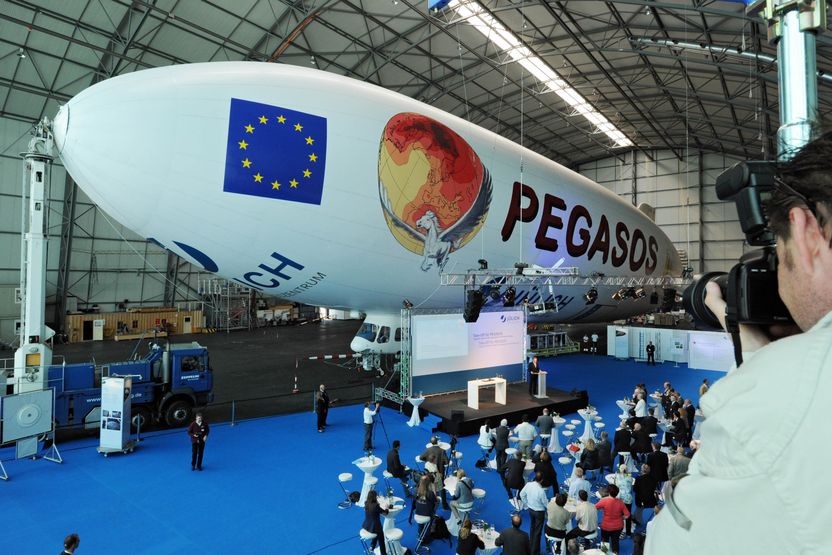Take-Off for PEGASOS: Jülich scientists conduct research on climate in Europe using Zeppelin NT
Advertisement
The longest deployment of the Zeppelin NT for climate research so far was officially launched on 4 May 2012 in a campaign coordinated by scientists from Jülich. For a total of twenty weeks, the airship will fly across Europe to measure the composition of the air above the Netherlands, Italy, the Adriatric and finally, in 2013, Finland. The measurement flights are part of the pan-European "PEGASOS" large-scale project, which involves twenty-six partners from a total of fourteen European countries and Israel investigating relationships between atmospheric chemistry and climate change. Federal Minister of Education and Research Annette Schavan praised the campaign at the official launch in Friedrichshafen. “The European large-scale project PEGASOS and the research flights with the Zeppelin NT make an important contribution to climate protection and modern sustainability research,” said Schavan. Robert-Jan Smits, the European Commission’s Director-General for Research and Innovation, referred to the project funded by the EU under its 7th Framework Programme as decisive for a joint European strategy to improve air quality and better fight climate change.

The Zeppelin NT before the start of the measurement flights.
Forschungszentrum Jülich
Scientists from Jülich are using the Zeppelin NT as a research platform for the third time – but it is the first time their campaign takes them across Europe. The two previous campaigns in 2007 and 2008 were funded by the Federal Ministry of Education and Research, and flights took place primarily in the Lake Constance region, where the climate scientists developed and tested the measuring instruments with which the Zeppelin is now equipped. During the current campaign, the scientists will use three different sets of measuring equipment to have a closer look at two actors in particular that can be found in atmospheric layers close to the ground: hydroxyl radicals (OH radicals), also referred to as the “detergent of the atmosphere”, and minute aerosols. Data on their formation and their contribution to climatic processes are expected to provide researchers with new insights, amongst others on the atmosphere’s ability to cleanse itself.
Thanks to the unique flight characteristics of the Zeppelin NT, the Jülich researchers can now also observe these processes in the region of the atmosphere that is decisive for them, the planetary boundary layer at an altitude of up to about 2000 metres. It is in this chemically very reactive, but as yet little investigated region that the fate of most of the pollutants emitted on the earth’s surface is decided. Information about this region is therefore necessary to understand the atmospheric processes in detail and to verify model concepts. The Zeppelin NT can float slowly at this altitude, hover in the air, ascend and descend vertically, and fly for up to 24 hours. During this campaign it carries measuring equipment weighing more than a tonne. It thus ideally complements measurements by aircrafts and fixed ground stations.
The airship is currently being converted into a research Zeppelin. From mid-May, the refitted Zeppelin NT will embark on a two-week journey to Cabauw in the Netherlands – always accompanied by an international team of fifteen scientists and technicians. During the five-week mission beginning in June, the airship will take the east route around the Alps to Italy, where measurements will be taken in the Po Valley and above the Adriatic in cooperation with Italian researchers. On the return flight to Friedrichshafen, the Zeppelin will take the west route around the Alps via France. Finally, in April 2013, the atmospheric researchers will set out towards Northern Europe on another two-month mission, heading for Hyytiälä in Finland. Both the mission routes and the measuring locations have been coordinated with existing ground measuring stations. In this way, the researchers can directly compare data from the flight with stationary measurements.
The Zeppelin campaign is part of the European Pan-European-Gas-AeroSOl-Climate Interaction Study, or PEGASOS for short, which is funded by the European Commission under its 7th Framework Programme for Research. The campaign will measure the influence of atmospheric chemistry on climate change and aims to clarify the decisive processes. The findings will provide a scientifically sound basis for climate protection measures throughout the EU and thus for improving air quality taking into account its impact on climate change. Global climate policy will benefit from the results of the project as well, because project partners are also involved in the work of the UN’s Intergovernmental Panel on Climate Change (IPCC).































































